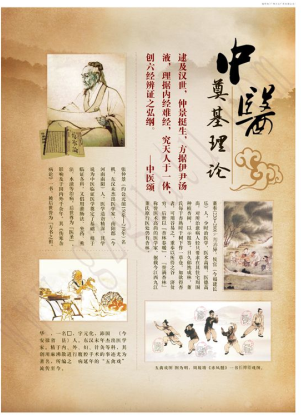The vessels in the whole body form a relatively close circulatory system for blood circulation. 'Such a system is known as blood vessels in TCM included in the concept of meridians and vessels. The minute capillaries are called blood collaterals.
Blood is propelled by the heart to circulate in the vessels. In fact the heart is the center of the blood circulatory system. In structure, the heart is connected with the vessels. That is why the heart can propel blood to circulate in the vessels. Since the circulation of blood is a circulatory process, the directions of blood circulation is either centrifugal or axopetal.
The former means that the blood is propelled by heart-qi to flow out from the heart to the whole body through large vessels into large collaterals and fine capillaries. In such a way blood enters the internal organs to nourish and moisten the body. The latter means that blood accumulates from the fine capillaries to the large collaterals and the vessels into the heart under the propelling action of the heart.

Apart from the heart, other internal organs are also involved in the circulation of blood, including the lung, the spleen and the liver. Structurally the lung is connected with all the vessels in the body, known as "the lung facing all the vessels". With the association with the vessels, the lung distributes nutrient substances, like the pectoral qi, to the whole body and accumulates qi and blood from the whole body to assist the heart to propel blood circulation.
The spleen commands blood, making the vessels compact, directing blood to circulate normally in the vessels and preventing it from flowing out of the vessels. The liver stores blood and regulates the volume of blood. Besides, the liver also governs dredging and dispersing, thus smoothing the activity of qi to promote blood circulation.
The factor that directly acts on blood circulation is qi. For example, heart-qi propels blood to circulate; lung-qi assists the heart to propel blood circulation; spleen-qi commands blood; and liver-qi regulates the circulation of blood by dredging and dispersing qi. If heart-qi is insufficient, blood will become too weak to circulate; if lung-qi is insufficient, there will be no opportunity for blood to disperse.
If spleen-qi is insufficient, it will be difficult for the spleen to command blood; if liver-qi fails to dredge, it will lead to stagnation of qi and stasis of blood. Besides, visceral yang also plays an important role in the circulation of blood. For example, deficiency of yang will inevitably cause deficiency of qi, making it difficult for blood to circulate; deficiency of yin will bring on cold and exuberant cold will coagulate blood.
Other factors that may affect blood circulation are the state of the vessels and the changes of cold and heat. Generally speaking, phlegm, dampness, blood stasis, swelling and nodules can block or compress the vessels and obstruct blood circulation. Blood is characterized by preference for warmth and aversion to cold. So excessive cold slows down the circulation of blood or even causes blood stasis; excessive heat accelerates blood circulation and even leads to bleeding in severe cases.







